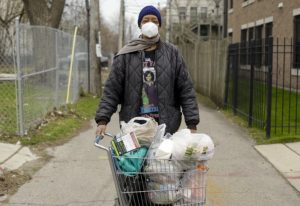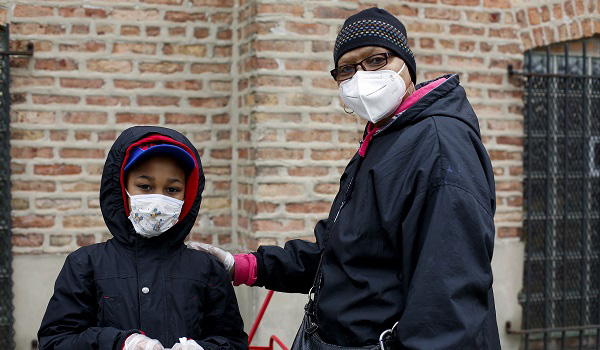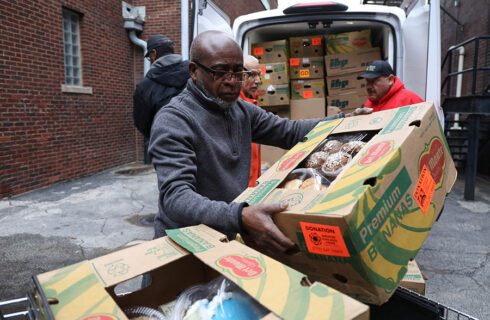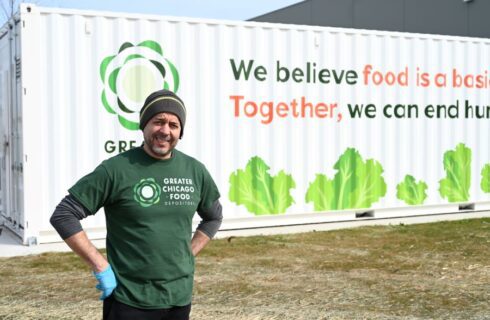The economic impact of the coronavirus pandemic likely will last years, particularly for low-income people, according to Diane Schanzenbach, one of the country’s foremost labor economists.
And so far, she said, Congress and the Trump administration have yet to unleash the single most effective stimulus tool during the Great Recession – increasing Supplemental Nutrition Assistance Program (SNAP) benefits, also known as food stamps, across the board.
That must be done to ease the suffering of millions of Americans and to spur economic growth, said Schanzenbach, director of the Institute for Policy Research at Northwestern University.

Diane Schanzenbach, former director of the Hamilton Project at the Brookings Institution, serves on the Food Depository's board of directors.
“This is not a crisis that charity can address alone,” said Schanzenbach, who is also a Food Depository board member. “SNAP is an effective and efficient way to meet increased need, as well as to stimulate the economy.”
Schanzenbach is not here to dispense false silver linings. She’s interested in smart and compassionate policy that could address the grim reality of this public health and economic crisis. The following interview has been edited for length and clarity.
How is the coronavirus pandemic increasing food insecurity?
First is the immediate need, right now, when everybody is sheltering in place and being instructed not to go shopping very often if they can avoid it. We’re seeing a number of aspects of increased need, especially regarding the elderly and those who are sick who really need not just groceries, but prepared meals. That’s a great need.
A second great need is the vast number of children who have lost access to school meals for breakfast and lunch. To address this in the short run, schools and communities have opened up feeding sites. But the one academic study that has come out so far found only 11 percent of families picked up meals from meal distribution sites in lieu of free- and reduced-priced lunch. Another new study found that nearly one in five households report that the kids in their homes are not eating enough because they couldn’t afford enough food.
Some states, including Illinois, have adopted the Pandemic-EBT program, which provides food vouchers to families who have lost access to school meals. Even though that helps, at this point it is only funded through the end of the school year and families will lose those benefits during the summer.
And the third great need will be the sustained increase in food insecurity for the months and years it will take for the economy to recover. The Congressional Budget Office predicts that the unemployment rate will be above 10 percent through 2021. For context, we only saw unemployment that high for one single month during the Great Recession. And we know that low-income families recover more slowly than the economy at large.
Who’s likely to be most affected?
With a shock this large, everyone will be affected in some way. We are truly in uncharted territory. I’m particularly concerned about those who are typically most vulnerable. This includes the elderly—especially those living in neighborhoods with high poverty. It also includes children, especially since we have lost school meals which are the front line of defense against child hunger. I’m also worried about individuals who were supposed to be facing a work requirement (for SNAP benefits) as of April 1. Thankfully, Congress has pushed back the work requirement for a couple months, but beyond that the status is in limbo.

Emry Brim Jr. stands for a portrait after receiving bags of food at Chosen Tabernacle Ministries.
We’re seeing that black and brown communities in Chicago are being disproportionately affected by the combination of COVID-19 and food insecurity. Is that the case in other urban areas?
Yes, definitely. It is a well-known empirical fact that during recessions African Americans and Latinx populations suffer a sharper increase in unemployment, and a slower recovery. This suggests it’s going to take longer for those communities to recover economically.
In addition, I worry about the impacts of anti-immigrant rhetoric and policy changes that have made it harder for immigrants to participate in safety net programs like SNAP.
What more can Congress do?
During the Great Recession, Congress increased SNAP benefits by 13.6 percent. That put more money into a lot of families’ pockets so they could buy more food. That worked really well both in terms of reducing unmet need as well as stimulating the economy. Congress should absolutely do this again.
Charities like the Food Depository play such an important role in feeding people when they face acute need. But the Food Depository can be more effective when a strong SNAP system is there as a base.
Hasn’t Congress already increased SNAP benefits?
Congress did temporarily, for two months, give a boost to many families. Under normal circumstances, a family’s SNAP allotment is calculated based on the income available to purchase food. Those with very low levels of income receive the maximum SNAP benefit, while those with earnings or other sources of income receive lower amounts. For the next two months, the normal benefits calculations are suspended and everyone will receive the maximum benefit allotment.
That was a fine Band-Aid to put on for two months, and it helped states process new cases more quickly. But going forward we need a sustained boost to SNAP, in part to meet increased need due to food price increases and in part to stimulate the economy as we recover from the recession.
"SNAP not only helps people, but it helps the economy. And we are going to need that help for quite some time as our economy recovers."
Our hope is during this next round of stimulus, Congress will raise the maximum benefit across the board by 15 percent. During the Great Recession the SNAP boost was the most effective stimulus program, dollar for dollar, across all the different stimulus programs that they enacted.
It is intuitive that SNAP is an effective stimulus. Participants spend all of the money quickly in their local communities buying food. Spending it all, and spending it quickly are a recipe for good economic stimulus.
SNAP not only helps people, but it helps the economy. And we are going to need that help for quite some time as our economy recovers.
Share This Post




